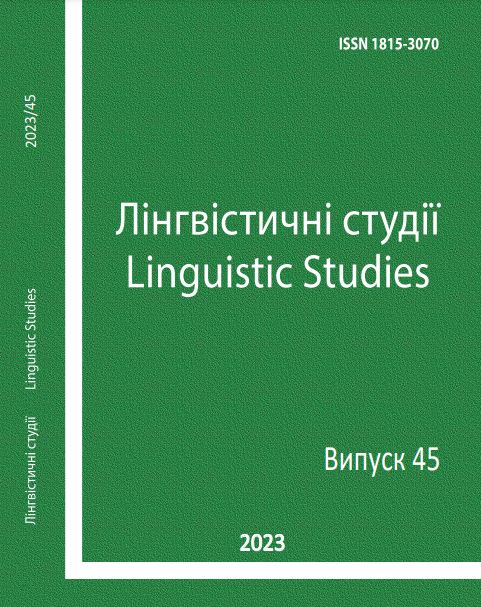Lexical semantic derivation models revisited
DOI:
https://doi.org/10.31558/1815-3070.2023.45.2Schlagworte:
semantic derivation; semantic shifts; model of situation; situation participant; tertium comparationis; cross-linguisticAbstract
Semantic derivation is one of the aspects that reveals the dynamic potential of lexical items, the mechanisms and strategies of lexical items’ extensions, the semantic associations that underlie the development of lexical items’ semantic paradigms. As a dynamic phenomenon, semantic derivation is interpreted in relation to the notion of semantic shift, which refers to a pair of senses linked by some genetic relations, either diachronically or synchronically. Such an approach correlates with the idea of semantic derivation consistency, which provides for establishing the characteristics of a lexical item’s semantic potential in its dynamic developing.
Literaturhinweise
Barcelona, A. Metaphor and metonymy at the crossroads: A cognitive perspective. Berlin. New York: Mouton de Gruyter, 2012. 368 p.
Croft, W. Radical construction grammar: Syntactic theory in typological perspective. Oxford: Oxford University Press, 2001. 416 p.
Cross-linguistic semantics: Explications, metalanguage, grammar. Ed. by C. Goddard. Amsterdam; Philadelphia: John Benjamins Publ., 2008. 356 p.
Dekker, P. Dynamic semantics. Dordrecht: Springer, 2012. 127 p.
Demenchuk, O. «Lexical semantic modelling in cross-linguistic perspective». Naukovyi chasopys natsionalnoho pedahohichnoho universytetu imeni M.P. Drahomanova. Seriia 9. Suchasni tendentsii rozvytku mov 17, 2018: 32–42.
[Demenchuk, O. «Lexical semantic modelling in cross-linguistic perspective». Науковий часопис національного педагогічного університету імені М.П. Драгоманова. Серія 9. Сучасні тенденції розвитку мов 17, 2018: 32–42.]
Demenchuk, O. «Modelling semantic derivation: Semantic shift strategies of irrational vocabulary in English». Advanced Education 12, 2019: 120–126.
Demenchuk, O. «Towards a typology of lexical semantic derivation models: Linguistic and psycholinguistic aspects». PSYCHOLINGUISTICS 28(2), 2020: 8–23.
From polysemy to semantic change. Towards a typology of lexical semantic association. Ed. by M. Vanhove. Amsterdam; Philadelphia: John Benjamins Publ., Co., 2008. 404 p.
Goldberg, A. E. Constructions: A construction grammar approach to argument structure. Chicago: University of Chicago Press, 1995, 265 p.
Johnson, M. «The philosophical significance of image schemas». From perception to meaning: Image schemas in cognitive linguistics. Ed. by B. Hampe. Berlin; New York: Mouton de Gruyter, 2005, 15–34.
Juvonen, J. «Making do with minimal lexica. Light verb constructions with make/do in pidgin lexica». The lexical typology of semantic shifts. Ed. by P. Juvonen, M. Koptjevskaja-Tamm. Berlin; Boston: Walter de Gruyter, 2016, 223–248.
Koptjevskaja-Tamm, M. «The lexical typology of semantic shifts: An introduction». The lexical typology of semantic shifts. Ed. by P. Juvonen, M. Koptjevskaja-Tamm. Berlin; Boston: Walter de Gruyter, 2016, 1–20.
Lakoff, G. Women, fire, and dangerous things: What categories reveal about the mind. Chicago: University of Chicago Press, 1987. 632 p.
Levin, B. «Semantics and pragmatics of argument alternations». Annual Review of Linguistics 1, 2015: 63–83.
Lewandowka-Tomaszczyk, B. «On semantic change in a dynamic model of language». Historical Semantics: Historical Word-Formation. Ed. by J. Fisiak. Berlin: Mouton de Gruyter, 1985, 297–323.
Lyons, J. Introduction to theoretical linguistics. Cambridge: Cambridge University Press, 1968. 519 p.
Mel’čuk, I. «Semantic description of lexical units in an Explanatory Combinatorial Dictionary: Basic principles and heuristic criteria». International Journal of Lexicography 1.(3). Oxford: Oxford University Press, 1988: 165–188.
Mel’čuk, I. «Explanatory Combinatorial Dictionary». Open Problems in Linguistics and Lexicography. Ed. by G. Sico. Monza: Polimetrica, 2006, 225–355.
Mel’čuk, I. Semantics. From meaning to text. Amsterdam; Philadelphia: John Benjamins Publ., 2015. Vol. 3, 546.
Multidimensional models of perception and cognition. Ed. by F.G. Ashby. New York; London: Taylor & Frencis Group & Psychology Press, 1992. 544 р.
Narrog, H. Modality, subjectivity, and semantic change. A cross-linguistic perspective. Oxford: Oxford University Press, 2012. 333 p.
OED: Oxford English Dictionary: Second Edition on CD-ROM. Oxford: Oxford University Press, 2009. Vers. 4.0.
Pustejovsky, J. The generative lexicon. Cambridge, MA; London: The MIT Press, 1996, 298 p.
Radden, G., Kӧvecses, Z. «Towards a theory of metonymy». Metonymy in language and thought. Ed. by K-U. Panther, G. Radden. Amsterdam; Philadelphia: John Benjamins Publ., 1999, 17–60.
RHWUD: Random House Webster’s Unabridged Dictionary. Electronic dictionary of American English. Seattle, WA: Random House, Inc.; Multimedia 2000, Inc. Vers. 3.0.
SUM: Slovnyk ukrainskoi movy: v 11 t. Redkolehiia: I. K. Bilodid (holova), L. S. Palamarchuk (zast. holovy), A. A. Buriachok ta in. Kyiv: Naukova dumka, 1970-1980. T. 1–11.
[Словник української мови: в 11 т. Редколегія: І. К. Білодід (голова), Л. С. Паламарчук (заст. голови), А. А. Бурячок та ін. Київ: Наукова думка, 1970-1980. Т. 1–11.]
Sweetser, E. E. From etymology to pragmatics: Metaphorical and cultural aspects of semantic structure. Cambridge: Cambridge University Press, 1990. 188 p.
Sweetser, E. E. «Compositionality and blending: Semantic composition in a cognitively realistic framework». Cognitive Linguistics: Foundations, Scope, and Methodology. Ed. by T. Janssen, G. Redeker. Berlin; New York: Walter de Gruyter, 1999, 129–162.
Taylor, J. Linguistic categorization. Prototypes in linguistic theory. Oxford: Clarendon Press, 1995. 312 p.
Therriault, D., Rinck, M. «Multidimentional situation models». Higher level language processes in the brain: Inference and comprehension processes. Ed. by F. Schmalhofer, C. Perfetti. Mahwah, NJ: Erlbaum, 2007, 311–328.
Traugott, E. C., Dasher, R. B. Regularity in semantic change. Cambridge: Cambridge University Press, 2005. 341 p.
Van Valin, R .D., Jr., LaPolla, R. J. Syntax: Structure, meaning and function. Cambridge: Cambridge University Press, 1997, 744 p.
Wierzbicka, A. Semantics, culture, and cognition: Universal human concepts in culture-specific configurations. Oxford; New York: Oxford University Press, 1992, 496 p.
Wierzbicka, A. Semantics: Primes and universals. Oxford: Oxford University Press, 1996, 512.
Zalizniak, Anna A. «A catalogue of semantic shifts. Towards a typology of semantic derivation». From polysemy to semantic change. Towards a typology of lexical semantic association. Ed. by M. Vanhove. Amsterdam; Philadelphia: John Benjamins Publ., 2008, 217–232.


